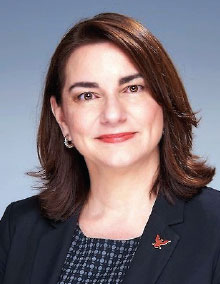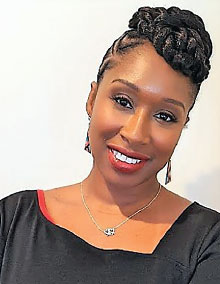The three APA members who participated in the Women’s Wellness Through Equity and Leadership (WEL) Program described the program’s influence on them in a simple term: Life changing.
Led by six health care organizations, the WEL Program’s goal is to provide early to mid-career women physicians with networking and education to build leadership skills, address equity-related issues, and implement strategies for wellness.
APA’s three participants, Xenia Johnson Bhembe, M.D., Simha Ravven, M.D., and Nicole Christian-Brathwaite, M.D., completed the program earlier this year. The program’s leadership is pursuing new grant funding to expand it and reach more women.
The partner organizations are, in addition to APA, the American Academy of Pediatrics, the American Academy of Family Physicians, the American College of Physicians, the American Congress of Obstetricians and Gynecologists, and the American Hospital Association. Each organization identified three women physicians to participate in webinars and meetings over 18 months.
“The impetus behind the program was to take an active role in changing the culture of medicine for women by addressing various issues facing women physicians such as salary inequities, work-life imbalance, and discrimination,” Theresa Miskimen, M.D., APA’s representative on the WEL Program’s Steering Committee, said in an email.
Miskimen is a clinical professor of psychiatry at the Rutgers Robert Wood Johnson Medical School and medical director at Hunterdon Medical Behavioral Health in Flemington, N.J. She served as mentor to APA’s participants.
Tackling some of the inequities women face, including gender norms, implicit bias, and other cultural forces, requires a shift in societal focus, Miskimen said. “We are talking about a diligent, long-term approach to fully change that culture,” she said. “Ultimately the physicians who participated in this project are in a unique position to develop into change agents in the coming years.”
“In residency, we’re not necessarily taught about the challenges of being a woman in leadership,” said Christian-Brathwaite, a child and adolescent and adult psychiatrist in Boston and CEO of the Well Minds Consulting Company. The WEL participants wrote what they referred to as their “indelible marks,” statements that encompassed what the participants wanted for themselves and their careers and how they wanted to use their skill sets to support their communities.
“I had these ideas in my head, but I never had the opportunity to put them on paper and explore my strengths and limitations,” Christian-Brathwaite said.
She had considered moving into private practice and starting a consulting company so she could spend time working with her community, and the program helped her cut through her doubts and pursue her goal.
Ravven, an assistant clinical professor in psychiatry in the Law and Psychiatry Division at the Yale University School of Medicine, said one of the most powerful aspects of the WEL Program is getting to see her colleagues take on big projects and leadership roles. She is now the president-elect of the Vermont Medical Society.
Women are generally responsible for a greater share of housework and child care than their male partners, Ravven pointed out. “A lot of us struggle balancing our family lives and clinical responsibilities. Taking on leadership roles on top of that feels daunting. I think many of our institutions, academic and otherwise, are just beginning to grapple with bias and structural sexism.”
Johnson Bhembe is an assistant professor of psychiatry and director of community minority affairs at the Cambridge Health Alliance. Before she started WEL, she had already launched a project in Boston aimed at exploring the impact of internalized racism on black Americans and how internalizing racist oppression prevents them from reaching their full potential. Through the WEL program, she began to envision her project on a much bigger scale.
“WEL gave me concrete ideas and strategies to develop my professional identity, but it also helped me grow and see how I might influence the discipline of medicine through my project,” she said.
The project, called Race Recovery, is still going strong in Boston, and Johnson Bhembe is now working on a national survey.
“A program like this changes your life,” Johnson Bhembe said of WEL. “It gives you a perspective on your contribution and your purpose in medicine that you may not have had before. It’s important that women’s ideas are heard.” ■


